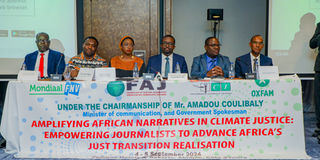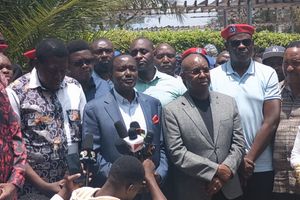African journalists demand equity in addressing climate challenges

President of FAJ Omar Faruk with other delegates during the Federation of African Journalists conference in Abidjan, Côte d'Ivoire.
African journalists meeting in Abidjan, Côte d'Ivoire, have called for a leading role in the continent's efforts to achieve climate justice.
At the meeting, convened by the Federation of African Journalists (FAJ) in collaboration with its affiliate, L' Union Nationale des Journalistes de Côte d'Ivoire (UNJCI), the continent's media professionals deliberated on the challenges and opportunities they face in responding to climate change.
The conference, themed "Amplifying African Narratives in Climate Justice: Empowering Journalists to Advance Africa's Just Transition Realisation", was part of a larger continental meeting -- the Climate Change and Africa Conference (CCDA-XII) -- which itself sought to position Africa with a unified voice ahead of the United Nations Conference of the Parties (COP29) in Baku, Azerbaijan, later this year.
The gathering of media professionals brought together leaders of journalists' unions from 29 countries across the continent, who reaffirmed their critical role as media professionals and trade unionists in advancing climate justice and promoting Africa's just transition.
“The narrative of Africa’s climate crisis must swiftly shift from one of vulnerability and despair to one of resilience, opportunity and leadership,” FAJ President Omar Faruk Osman told delegates. He noted that African journalists must be equipped with the critical tools to lead this transformation and position themselves as central actors in the global climate movement.
“Our journalists are not just amplifying African voices in international platforms—they are demanding decisive action and equity in addressing the continent’s distinct climate challenges,” he stressed.
The Abidjan Climate Change and Africa Conference is the 12th edition of the annual meeting that precedes the Global Conference on Climate Change, which offers a platform to discuss efforts to stabilise greenhouse gas concentrations in the atmosphere. It also hosts the African Ministerial Conference on the Environment.
CCDA-XII was convened under the theme ‘Financing Climate Adaptation and Resilience in Africa,’ and it focused on the critical issues of climate finance, green growth, climate justice, and regional cooperation.
The meetings come amid reports of flooding and destruction across the continent. In West Africa, Sierra Leone and neighbouring Guinea have been among the most affected by the flooding that has destroyed property and claimed lives.
Climate campaigners say it is unfair that the continent faces a disproportionate impact from climate change, despite contributing less than 4 percent of global greenhouse gas emissions.
They say that adapting to these adverse effects is a major concern and that securing adequate funding is key to ensuring this happens.
And for this to happen, the media is crucial, the FAJ said in a press release at the end of the conference.
“As one of the most vulnerable continents to climate impacts, Africa urgently needs its journalists to take the lead in reshaping public narratives, demanding accountability and driving climate action,” it said.
Media professionals, it said, are crucial in shaping public understanding and narratives around climate change and the need for immediate action, adding that they can also highlight the creation of green jobs and take the lead in shaping perceptions and influencing policies for a fairer, more sustainable future.
The media’s “influence extends far beyond simply reporting events; you play a critical role in educating the public, shaping perceptions and driving action. You can help communicate the benefits of a just transition, such as job creation, economic resilience and environmental sustainability, while addressing the social impacts on affected communities,” said Coumba Diop of ILO, the co-organiser of the media conference.
The conference culminated in the adoption of the Abidjan Declaration, which calls for increased cooperation between journalists, trade unions and civil society to strengthen African perspectives in climate change discussions.
The Declaration stressed the urgency of advancing a just transition in Africa by advocating for inclusive, low-carbon development strategies that prioritise equitable job creation and sustainable growth. It also emphasised the need for strong accountability mechanisms to ensure that governments and corporations live up to their climate commitments.
An Action Plan was also developed, providing a clear roadmap for advancing climate action across the continent.





